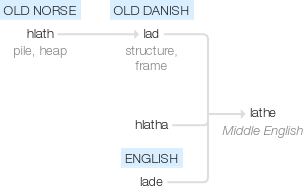Lathe
Middle English: probably from Old Danish lad ‘structure, frame’, perhaps from Old Norse hlath ‘pile, heap’, related to hlatha (see lade1).
wiktionary
From Middle English lathen, from Old English laþian(“to invite, summon, call upon, ask”), from Proto-Germanic *laþōną(“to invite”), from Proto-Indo-European *lēy-(“to want, desire”). Cognate with German laden(“to invite”), Icelandic laða(“to attract”).
From Middle English *lath, from Old English lǣþ(“a division of a county containing several hundreds, a district, lathe”).
From Middle English lath(“turning-lathe; stand”), from Old Norse hlað(“pile, heap”)—compare dialectal Danish lad(“stand, support frame”) (as in drejelad(“turning-lathe”), savelad(“saw bench”)), dialectal Norwegian la, lad(“pile, small wall”), dialectal Swedish lad(“folding table, lay of a loom”)—from hlaða(“to load”). More at lade.
etymonline
lathe (n.)
"machine for turning wood, etc., so it can be worked by a tool held at rest," early 14c., of uncertain origin, probably from a Scandinavian source. OED compares Danish drejelad "turning-lathe;" other compounds with the element suggest a sense "framework, supporting structure." Others see a possible connection to Old Norse hloeða "to lade, load, saddle (a horse)."
